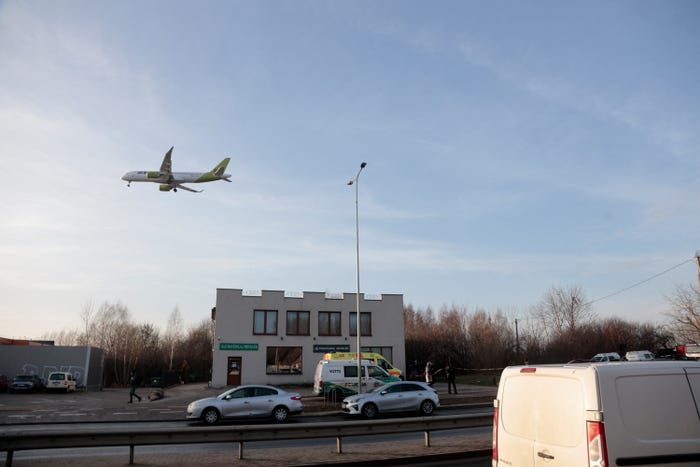Top Stories
Lithuania Closes Airports for Third Night Amid Balloon Threat

UPDATE: Lithuania has closed Vilnius Airport for the third consecutive night due to balloons drifting in from Belarus, raising urgent air safety alarms. The closure, which occurred from 9:42 p.m. to 4:30 a.m., affected 47 flights as authorities grapple with the threat posed by these helium-filled balloons.
Officials have stated that the balloons, likely linked to cigarette smuggling operations, have been increasingly invading Lithuanian airspace. In a statement released on Sunday, authorities confirmed that the airspace around Vilnius had to be temporarily suspended to prevent potential accidents.
Lithuanian Prime Minister Inga Ruginiene has directly blamed the government of Belarus for allowing these balloons to “run wild.” She noted that the situation represents a continuing escalation, as balloons have been detected entering Lithuanian territory in larger numbers recently. Earlier this month, reports indicated that an astonishing 250 balloons crossed the border in just one month.
In a separate announcement on Saturday, Prime Minister Ruginiene revealed that a “large group of smuggling meteorological balloons” had been launched from Belarus. Another airport, located in Kaunas, was also forced to close earlier due to similar threats.
As the situation develops, Lithuania has decided to temporarily close its borders with Belarus. The security council is set to meet on Monday to discuss further actions regarding this ongoing crisis, which has become increasingly pressing in light of frequent airspace violations from both Belarus and Russia.
This week’s incidents mark a troubling trend for the Baltic nation, with local officials reporting that hundreds of balloons were detected on a single night. Many of these balloons are equipped with GPS trackers and SIM cards, allowing smugglers to track their cargo effectively. In total, over 100 people have been arrested this year for air smuggling, with 20 convictions already secured.
Lithuania’s predicament is underscored by broader concerns within NATO, as European allies remain on heightened alert following drone incursions over Poland in September, attributed to Russian military operations. Other NATO countries, including Denmark, have also reported similar airspace violations.
The ongoing balloon threat in Lithuania echoes past incidents, such as those involving North Korea, where balloons filled with debris were sent into South Korea as part of psychological warfare tactics.
Officials are calling for tech companies and defense contractors to devise solutions for tracking and neutralizing these balloons to safeguard airspace effectively.
In this tense climate, the balloon incursions serve as a stark reminder of the challenges faced by countries bordering Belarus, and the potential ramifications for regional stability. As authorities in Lithuania respond to these escalating threats, the international community watches closely, underscoring the urgent need for coordinated security measures.
Stay tuned for further updates on this developing story.
-

 Science2 weeks ago
Science2 weeks agoResearchers Challenge 200-Year-Old Physics Principle with Atomic Engines
-

 Politics1 week ago
Politics1 week agoNHP Foundation Secures Land for 158 Affordable Apartments in Denver
-

 World2 days ago
World2 days agoBoeing’s Aircraft Production: Assessing Numbers and Challenges
-

 Health2 weeks ago
Health2 weeks agoNeuroscientist Advocates for Flag Football Until Age 14
-

 Lifestyle1 week ago
Lifestyle1 week agoLongtime Friends Face Heartbreak After Loss and Isolation
-

 Top Stories3 days ago
Top Stories3 days agoUrgent Search for Suspect Who Exposed Himself to Teen Girl
-

 World2 weeks ago
World2 weeks agoGlobal Military Spending: Air Forces Ranked by Budget and Capability
-

 Health1 week ago
Health1 week agoFDA Launches Fast-Track Review for Nine Innovative Therapies
-

 Business1 week ago
Business1 week agoMaine Housing Inventory Surges to Post-Pandemic High
-

 Business2 weeks ago
Business2 weeks agoSpirit Airlines Cuts Workforce with Furloughs for 365 Pilots
-

 Politics2 weeks ago
Politics2 weeks agoIsraeli Air Strikes in Lebanon Kill One, Wound Seven Amid Tensions
-

 World2 weeks ago
World2 weeks agoTroops to Enjoy Buffalo Chicken, Thai Curry in 2026 MREs









